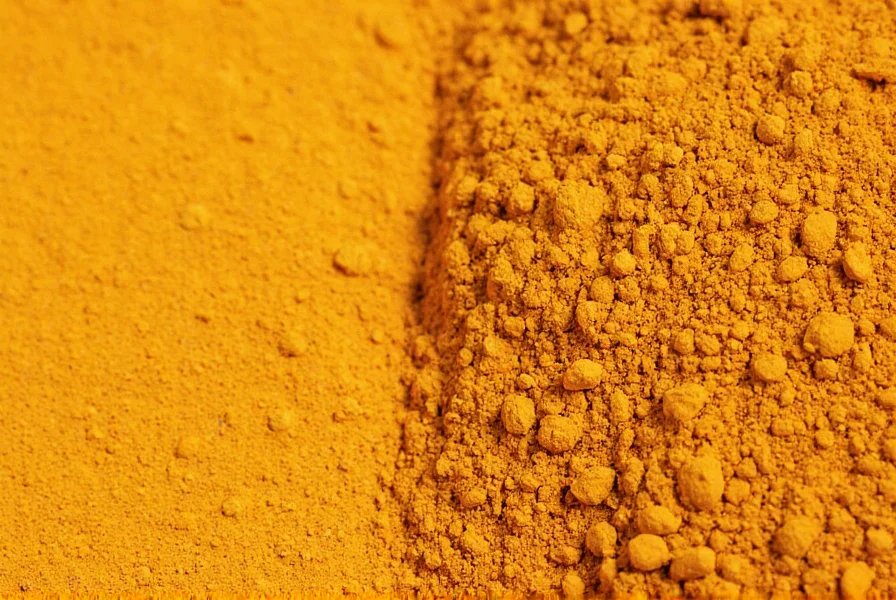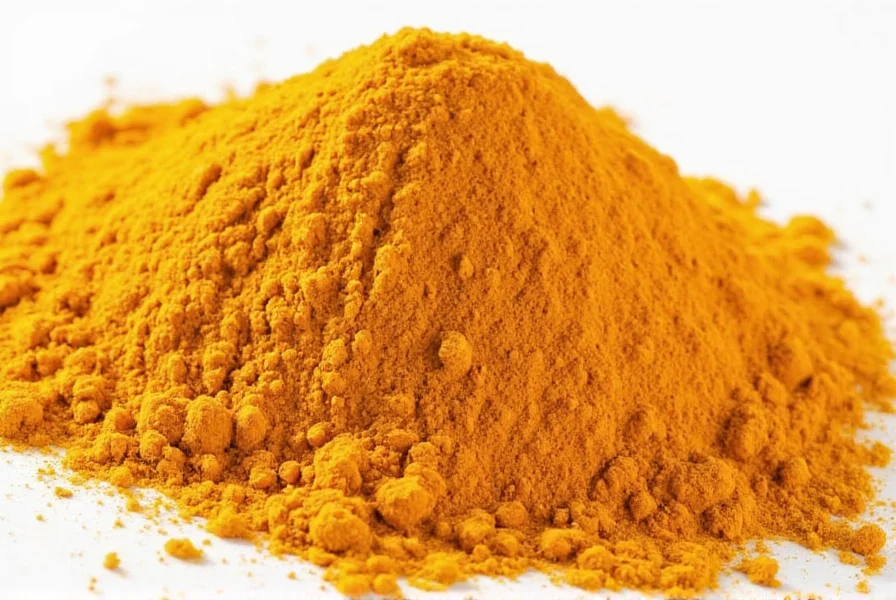Understanding the shelf life of turmeric powder is essential for both home cooks and health-conscious individuals. This vibrant yellow spice, celebrated for its earthy flavor and potential health benefits, remains a staple in kitchens worldwide. But does turmeric powder go bad? The straightforward answer is yes—though not in the same way perishable foods do.
How Turmeric Powder Degrades Over Time
Turmeric powder doesn't spoil like fresh produce, but its quality deteriorates through three primary mechanisms:
- Loss of volatile compounds – The essential oils responsible for turmeric's distinctive aroma and flavor gradually evaporate
- Color fading – Curcumin, the compound that gives turmeric its vibrant yellow hue, breaks down when exposed to light and air
- Potency reduction – The concentration of beneficial compounds decreases significantly over time
Unlike fresh foods that develop harmful bacteria when spoiled, degraded turmeric primarily suffers from diminished culinary and potential therapeutic value. However, improper storage can lead to actual spoilage through moisture absorption and mold growth.
Shelf Life of Turmeric Powder: What to Expect
The longevity of your turmeric powder depends heavily on storage conditions. Here's what research and food safety experts indicate about turmeric powder shelf life:
| Storage Method | Optimal Quality Duration | Maximum Safe Duration | Quality Indicators |
|---|---|---|---|
| Pantry (original packaging) | 6-12 months | 18 months | Rapid color fading, noticeable aroma loss |
| Pantry (airtight container) | 2-3 years | 4 years | Gradual potency reduction |
| Refrigerated (airtight) | 3-4 years | 5 years | Minimal quality loss |
| Freezer (vacuum-sealed) | 4-5 years | Indefinite | Nearly preserved original quality |
These timeframes represent when turmeric maintains its peak quality. While consuming turmeric beyond these periods isn't necessarily dangerous, its effectiveness for both cooking and potential health applications diminishes considerably.
Proper Storage Techniques for Maximum Longevity
Maximizing the shelf life of turmeric powder requires attention to three critical environmental factors: light, moisture, and air exposure. Follow these evidence-based storage recommendations:
- Transfer turmeric from its original packaging to an opaque, airtight container immediately after purchase
- Store in a cool, dark cupboard away from heat sources like stoves or ovens
- Maintain consistent storage temperature (fluctuations accelerate degradation)
- Never store above 77°F (25°C) for extended periods
- Use clean, dry utensils when handling to prevent moisture contamination
For those seeking extended preservation, consider freezing turmeric powder in vacuum-sealed portions. This method preserves both flavor compounds and curcumin content significantly longer than pantry storage.
Identifying Spoiled Turmeric Powder: Key Warning Signs
While turmeric powder rarely becomes dangerous, certain conditions indicate it's time for disposal. Watch for these definitive signs that your turmeric powder has gone bad:
- Visible mold growth – Any fuzzy spots or discoloration indicates biological contamination
- Clumping with moisture – Hard clumps that don't break apart easily suggest water exposure
- Off odors – Rancid, musty, or otherwise unpleasant smells indicate spoilage
- Unusual taste – Bitter or sour notes instead of earthy warmth
- Wet texture – Any dampness to the touch
When in doubt about whether turmeric powder has gone bad, perform the sniff test. Fresh turmeric has a distinctive warm, earthy aroma with citrus notes. If this characteristic scent has disappeared or turned unpleasant, the powder has likely degraded beyond useful quality.
Health Considerations of Using Expired Turmeric
Consuming turmeric powder that has merely lost potency presents minimal health risks but offers diminished benefits. However, turmeric showing actual spoilage signs can cause problems:
- Moldy turmeric may contain mycotoxins that can cause digestive issues
- Moisture-contaminated powder could harbor bacteria
- Significantly degraded turmeric provides minimal curcumin content
For culinary use, slightly aged turmeric remains safe but requires larger quantities to achieve desired flavor and color. For those using turmeric for potential health benefits, degraded powder delivers substantially reduced curcumin levels—the compound responsible for most researched effects.

Practical Tips for Maintaining Turmeric Quality
Extend your turmeric powder's useful life with these practical strategies:
- Buy smaller quantities more frequently rather than bulk purchases
- Consider purchasing whole turmeric root and grinding as needed for maximum freshness
- Store multiple small portions rather than one large container to minimize air exposure
- Place desiccant packets in storage containers to absorb ambient moisture
- Label containers with purchase dates to track freshness
When evaluating whether your turmeric powder has gone bad, remember that gradual quality decline differs from actual spoilage. While older turmeric remains safe if properly stored and shows no spoilage signs, its effectiveness for both cooking and potential health applications diminishes significantly after the 2–3 year mark under optimal storage conditions.
How can I tell if my turmeric powder is still good to use?
Fresh turmeric powder should have a vibrant yellow-orange color, distinctive earthy aroma with citrus notes, and flow freely without clumping. If it has lost its strong color, shows signs of moisture, has developed an off smell, or forms hard clumps that don't break apart, it's time to replace it. The sniff test is most reliable – if the characteristic warm aroma is gone or unpleasant, the quality has significantly degraded.
Can expired turmeric powder make you sick?
Turmeric powder that has simply lost potency over time (beyond its prime shelf life but without spoilage signs) won't make you sick but offers diminished flavor and potential benefits. However, turmeric showing actual spoilage signs like mold, moisture, or off odors could potentially cause digestive issues. Discard immediately if you notice any visible mold, wet clumps, or unpleasant odors, as these indicate biological contamination.
Does turmeric powder expire if kept in the refrigerator?
Refrigeration significantly extends turmeric powder's shelf life when stored properly in an airtight container. While it won't technically "expire" in terms of safety, its quality gradually declines. Refrigerated turmeric maintains optimal quality for 3-4 years, compared to 2-3 years in the pantry. The key is preventing moisture exposure – always allow the container to reach room temperature before opening to avoid condensation.
What's the difference between 'best by' date and actual spoilage for turmeric?
The 'best by' date on turmeric packaging indicates when the product maintains peak quality, not when it becomes unsafe. Properly stored turmeric often remains usable well beyond this date, though with reduced potency. Actual spoilage involves visible changes like mold growth, moisture absorption, or off odors. Turmeric without spoilage signs but past its 'best by' date is generally safe to use but may require larger quantities to achieve desired flavor and color in recipes.
How long does turmeric powder last after opening?
Once opened, turmeric powder maintains optimal quality for 6-12 months when stored in its original packaging. Transferring it to an opaque, airtight container immediately after opening extends this to 2-3 years. The critical factors are minimizing exposure to light, air, and moisture. Each time you open the container, you introduce elements that accelerate degradation, so proper storage technique significantly impacts how long turmeric powder remains effective after opening.











 浙公网安备
33010002000092号
浙公网安备
33010002000092号 浙B2-20120091-4
浙B2-20120091-4